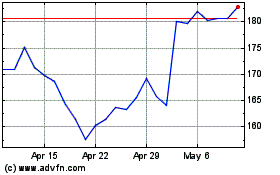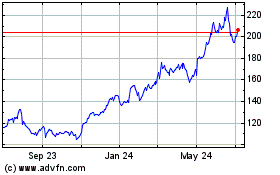By Ted Greenwald
The Federal Trade Commission's lawsuit against Qualcomm Inc.
this week is part of an escalating international regulatory battle
that has laid bare tensions between the dominant maker of
smartphone chips and some of its biggest customers.
The commission's complaint, filed Tuesday in federal court in
California, alleges Qualcomm used illegal tactics to maintain a
monopoly on a key type of chip used in cellphones, harming phone
makers including Apple Inc. and Samsung Electronics Co., whose
names appear repeatedly in the complaint.
Qualcomm has said it will fight the FTC's suit, which it said is
based on inaccurate information and was rushed out ahead of the
change in presidential administrations.
The U.S. regulatory action came after South Korea's antitrust
regulator last month announced a roughly $853 million fine on
Qualcomm for alleged anticompetitive patent licensing practices --
a decision Qualcomm also vowed to fight.
Devices sold by Apple and Samsung accounted for nearly half of
Qualcomm's revenue, which totaled $23.5 billion in the latest
fiscal year. Samsung's relationship with Qualcomm is complicated:
In addition to using Qualcomm chips in its smartphones, it also
manufactures chips for Qualcomm -- and Samsung makes its own chips,
making it a potential competitor.
Device makers including Samsung and Apple pay Qualcomm licensing
fees and royalties based on a percentage -- as high as 5% -- of the
price of a device. Qualcomm licenses its patents in a bundle even
if customers use only a portion of the technology. The company gets
most of its pretax profit from such licensing.
For handset makers facing competitive pressure to cram more
electronics into smartphones while keeping prices down, Qualcomm's
approach to licensing is a costly burden, said Rufus Pichler, a
partner at Morrison & Foerster LLP, a law firm specializing in
intellectual property issues. They pay for chips and then pay again
for the underlying intellectual property, much of which they may
have no use for.
"Device manufacturers are under a lot of pressure to reduce
their costs and royalty burden across the board, and Qualcomm is a
big chunk of that, " said Mr. Pichler.
Said Stacy Rasgon, analyst for Sanford C. Bernstein: "Nobody
likes to pay Qualcomm."
Qualcomm declined to comment on its relationships with
customers.
Apple declined to comment. Samsung did not respond to a request
for comment.
The FTC's suit alleges that Apple sought relief from Qualcomm's
intellectual-property charges, which the commission suggests
exceeded the limits of the "fair, reasonable, and
non-discriminatory" terms that Qualcomm must commit to as an owner
of patents essential to making smartphones. Qualcomm gave Apple a
break on patent licensing costs in return for the iPhone maker's
commitment to use Qualcomm chips exclusively, blocking competitors,
the suit alleges.
That deal has expired, and Apple used chips from both Qualcomm
and Intel Corp. in its iPhone 7, launched last year.
The FTC complaint also says Samsung, among other chip makers,
had sought to license Qualcomm patents deemed essential for making
smartphones, but Qualcomm refused.
After the Korean regulator's action, Qualcomm signaled suspicion
that Apple and Samsung were involved by asking a U.S. federal court
to compel them -- along with five rival chip makers -- to hand over
any documents they may have provided to Korean authorities.
Qualcomm said the seven companies supplied documents and testimony
to the Korea Fair Trade Commission that would be kept confidential
under South Korean procedures.
A Qualcomm spokeswoman at the time said the company sought the
documents to better defend itself, and that there was nothing
adversarial about its filings.
Qualcomm says its innovations have facilitated explosive growth
of mobile communications, benefiting others in the industry. It
argues that its bundled approach to licensing patents is
cost-efficient for handset makers and chip makers alike, and that
licensing per component would add an expensive layer of
administration. The company notes that it has been licensing
patents this way for many years.
Not every semiconductor company licenses patents this way. ARM
Holdings PLC, whose technology is widely used in smartphones, sells
its licenses to chip vendors -- including Qualcomm -- not device
makers, for pennies per chip, not dollars per device, Bernstein's
Mr. Rasgon said. "It's viewed as a partner," he said. "Qualcomm is
viewed as a tax."
The antitrust actions in the U.S. and South Korea are likely to
take years to resolve, experts say. And the future of the FTC case
isn't clear, given the impending change in the White House.
However, the cases reinforce the sense that Qualcomm's customers
want to pay less for its patents, which could erode the chip
maker's ability to squeeze high profits from its intellectual
property, according to Mr. Pichler.
The biggest risk, Mr. Rasgon said, is the regulators' challenge
to whole-device licensing. The average selling price of a
smartphone is 10 times that of the chips that drive it, he said,
and shifting how the intellectual property is licensed could
sharply reduce revenue in Qualcomm's technology licensing
business.
Write to Ted Greenwald at Ted.Greenwald@wsj.com
(END) Dow Jones Newswires
January 19, 2017 10:22 ET (15:22 GMT)
Copyright (c) 2017 Dow Jones & Company, Inc.
QUALCOMM (NASDAQ:QCOM)
Historical Stock Chart
From Mar 2024 to Apr 2024

QUALCOMM (NASDAQ:QCOM)
Historical Stock Chart
From Apr 2023 to Apr 2024
